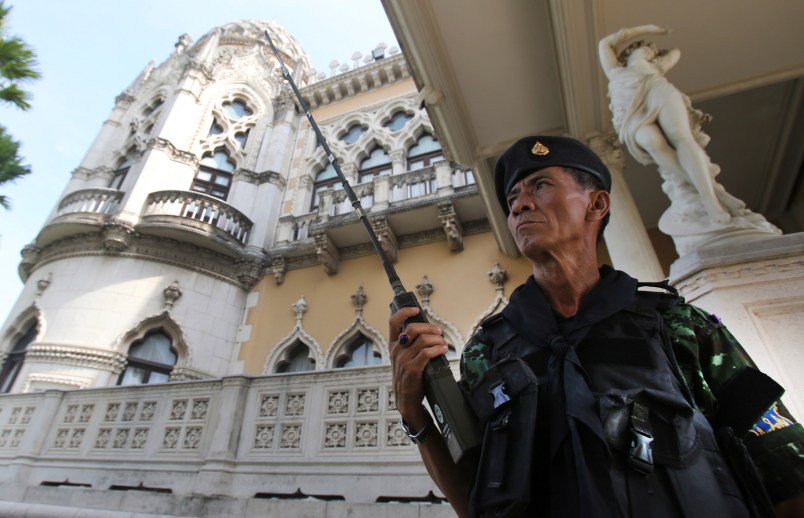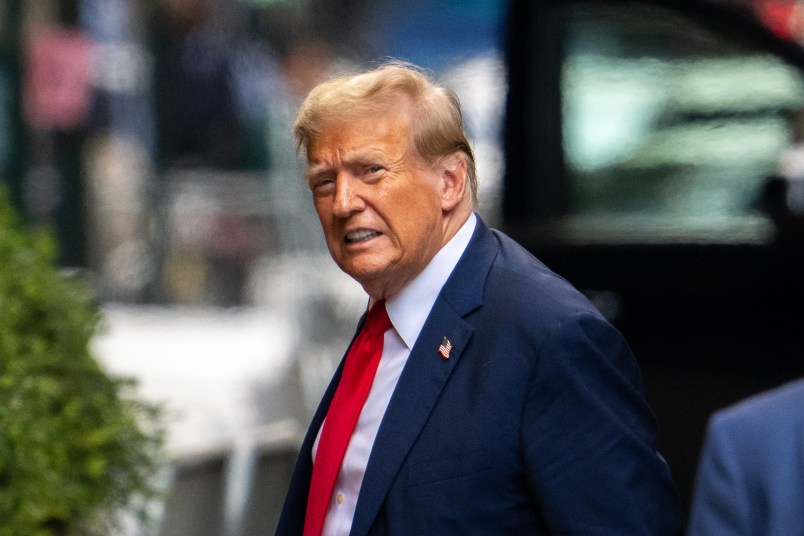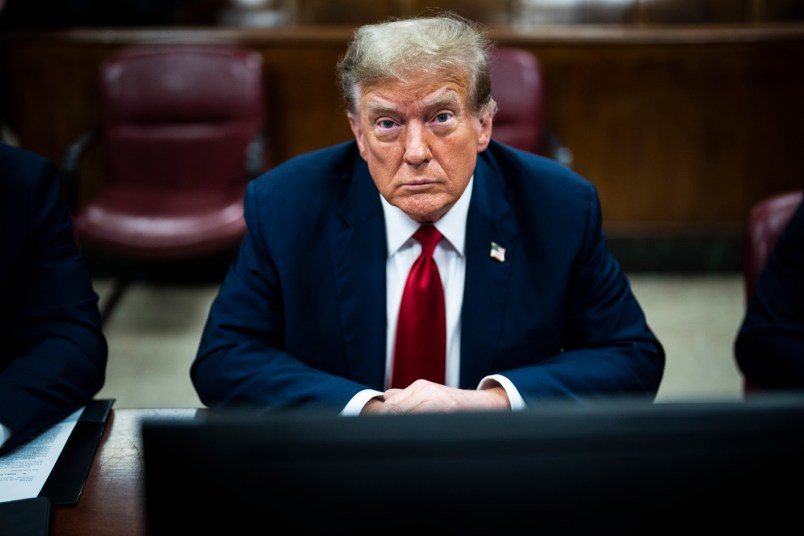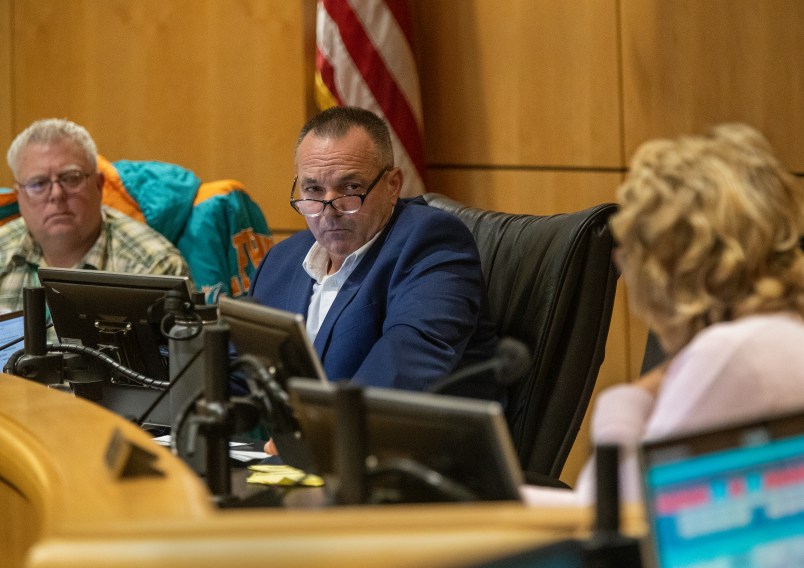BANGKOK (AP) — Thailand’s powerful army declared martial law Tuesday and deployed troops into the heart of Bangkok in a dramatic move it said was aimed at stabilizing the Southeast Asian country after six months of turbulent political unrest. The military insisted a coup d’etat was not underway.
The surprise, pre-dawn operation, which places the army in charge of public security nationwide, came amid deepening uncertainty over the nation’s fate and one day after the caretaker prime minister refused to step down in the face of long-running anti-government protests.
Although soldiers entered multiple television stations to broadcast the army message, life in the vast skyscraper-strewn metropolis of 10 million people remained largely unaffected, with schools, businesses and tourist sites open and traffic flowing as usual.
In front of one of the country’s most luxurious shopping malls, bystanders gawked at soldiers in jeeps mounted with machine guns who briefly diverted traffic. The mood wasn’t tense; passers-by stopped to take cell phone pictures of the soldiers.
Thailand, an economic hub for Southeast Asia, has been gripped by off-and-on political turmoil since 2006, when former Prime Minister Thaksin Shinawatra was toppled by a military coup after being accused of corruption, abuse of power and disrespect for King Bhumibol Adulyadej. His overthrow triggered a power struggle that in broad terms pits Thaksin’s supporters among a rural majority against a conservative establishment in Bangkok.
The army, seen by many as sympathetic to anti-government protesters, has staged 11 coups since the end of absolute monarchy in 1932. But it made no moves Tuesday to dissolve the country’s constitution or its current, caretaker government.
Acting Prime Minister Niwattumrong Boonsongpaisan — who was not consulted
beforehand on the army move — called an emergency Cabinet meeting at an
undisclosed location. In a brief statement, Niwattumrong said only that the government hopes the military action will “bring peace back to the people of every group and every side.”
Education Minister Chaturon Chaisang, however, said in a post on his Facebook page that martial law was not an answer and warned it could “eventually spiral into a situation in which the military has no choice but to stage a coup.”
Thailand’s problems are “fundamentally political problems that must be solved
through political processes under democracy … not military or security measures,” Chaturon said.
The military statement was issued Tuesday by army chief Gen. Prayuth Chan-Ocha, who cited a 1914 law that gives the authority to intervene during crises. He said the military took action to avert street clashes between political rivals.
“The Royal Thai Army intends to bring back peace and order to the beloved
country of every Thai as soon as possible,” he said. We “intend to see the situation resolved quickly.”
Prayuth met Tuesday afternoon with senior officials from government agencies, provincial governors and representatives from the country’s independent agencies — but not the Cabinet.
The latest round of unrest started last November, when demonstrators took to the streets to try to oust then-Prime Minister Yingluck Shinawatra, Thaksin’s sister. She dissolved the lower house of parliament in December in a bid to ease the crisis, and later led a weakened, caretaker government.
Earlier this month, the Constitutional Court ousted Yingluck and nine Cabinet ministers for abuse of power. But the move, which left the ruling party in charge of government, did little to resolve the conflict.
Competing protests in Bangkok have raised concerns of more violence, which were heightened by anti-government protesters who set a Monday deadline for achieving their goals of ousting the remnants of the government.
An overnight attack last week on the main anti-government protest site left 3 dead and more than 20 injured. It raised the toll since November to 28 dead and drew a strong televised rebuke from the army chief.
“This week looked ominous,” said Thitinan Pongsudhirak, director of the
Institute of Security and International Studies at Bangkok’s Chulalongkorn University. “There was a strong likelihood of violence and turmoil.”
“Martial law is intended to impose peace and order, but the key will be the army treatment of the two sides,” Thitinan said. “If the army is seen as favoring one side over the other, then we could see the situation spiral and deteriorate. If the army is seen as even-handed … we could actually see the situation improving.”
Throughout the morning, the army issued multiple edicts. In one, they asked TV and radio stations to be on standby to interrupt programming for army broadcasts when asked. At least 10 politically affiliated private TV stations from both sides ceased broadcasting — after armed soldiers entered and requested they do so.
Prayuth said rival protesters could remain at their rally sites as long as remain peaceful and stop marching. The leader of anti-government demonstrators, Suthep Thaugsuban, handed a bouquet of flowers to army officers taking care of
the Government House complex as his supporters vacated a building they had occupied for a week.
The leader of the pro-government Red Shirt movement, Jatuporn Prompan, said his group could accept martial law, but “won’t tolerate a coup or other non-constitutional means” to grab power.
“We will see what the army wants,” he said, warning that the undemocratic removal of the country’s caretaker government “will never solve the country’s crisis and will plunge Thailand deeper into trouble.”
Red Shirts had been massing for days on the outskirts of Bangkok, and Jatuporn said his supporters were being “surrounded.” More than 100 soldiers deployed near the rally venue with coils of barbed wire to block roads; they appeared to be taking over control of the area from police and rumors spread they would conduct a raid in search for weapons.
Brad Adams, Asia Director for Human Rights Watch, said denounced the army move, calling it “a de facto coup.”
“The military has pulled a 100 year old law off the shelf that makes the
civilian administration subordinate to the military, effectively rendering the executive, legislative and judicial branches powerless,” Adams said.
U.S. State Department spokesperson Jen Psaki said the U.S. was “very concerned about the deepening political crisis in Thailand.”
We “urge all parties to respect democratic principles, including respect for freedom of speech,” she said. “We expect the Army to honor its commitment to make this a temporary action to prevent violence, and to not undermine democratic institutions.”
On Monday, Thailand’s acting prime minister insisted his government will not resign, resisting pressure from a group of senators who are seeking ways to settle the country’s political crisis, and from anti-government protesters who are demanding an appointed prime minister.
A group of about 70 senators, most of them seen as siding with anti-government
protesters, proposed a framework Friday that calls for a new interim government with full power to conduct political reforms. The Senate, the country’s only functioning legislative body, had been seen as the last resort of the anti-government protesters.
___
Associated Press writers Jocelyn Gecker and video journalists Kiko Rosario and Raul Gallego Abellan in Bangkok and Deb Riechmann in Washington contributed to this report.
Copyright 2014 The Associated Press. All rights
reserved. This material may not be published, broadcast, rewritten or
redistributed.









